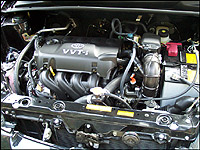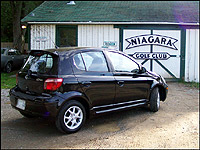Did I say the words zipping and Echo in the same sentence? To be fair Toyota's subcompact sedan, that is still being made incidentally, moves along at a fairly brisk pace as it is. The Echo Hatch, believe it or not, actually gains 21 kg (46 lbs) despite its tail having been lopped off, but still its 108-hp 1.5-L Variable Valve Timing with intelligence (VVT-i) enhanced 4-cylinder feels like a rarified rocket.
 |
| The Echo Hatch's 108-hp 1.5-L Variable Valve Timing with intelligence (VVT-i) enhanced 4-cylinder engine makes it feel like a rarified rocket. (Photo: Trevor Hofmann, Canadian Auto Press) |
It takes a great deal of composure not to burn rubber when leaving a stoplight, with concurrent screeches in 2nd and even 3rd gear to follow. Its surprising get up and go, mind you, has more to do with its featherweight 944 kg (2,081 lbs) than it does with its at-the-wheel horsepower or 105 lb-ft of torque.
 |
| The little hatch, with its low mass and zippy engine, handles great. (Photo: Trevor Hofmann, Canadian Auto Press) |
To put it in perspective I once had a 1st generation MR2 company car - obviously in freer (single with no children) days. I impressed all my friends with its robust 112-hp 1.6-L engine, its acceleration was magical. Looking back the Echo Hatch's measly 108-hp is only 4 down on Toyota's mid-engine Ferrari fighter (OK, that one was a bit of a stretch), and its weight is well under the old sports car. Put two and two together and the Echo Hatchback is one hot little package.
It handles great too. Again, there's nothing that improves lateral acceleration like low mass. The Hatchback's MacPherson strut front suspension with offset coil springs delivers predictable cornering, while its torsion beam setup with low-mounted coil springs in the rear is more or less standard fare for the hatchback genre.

